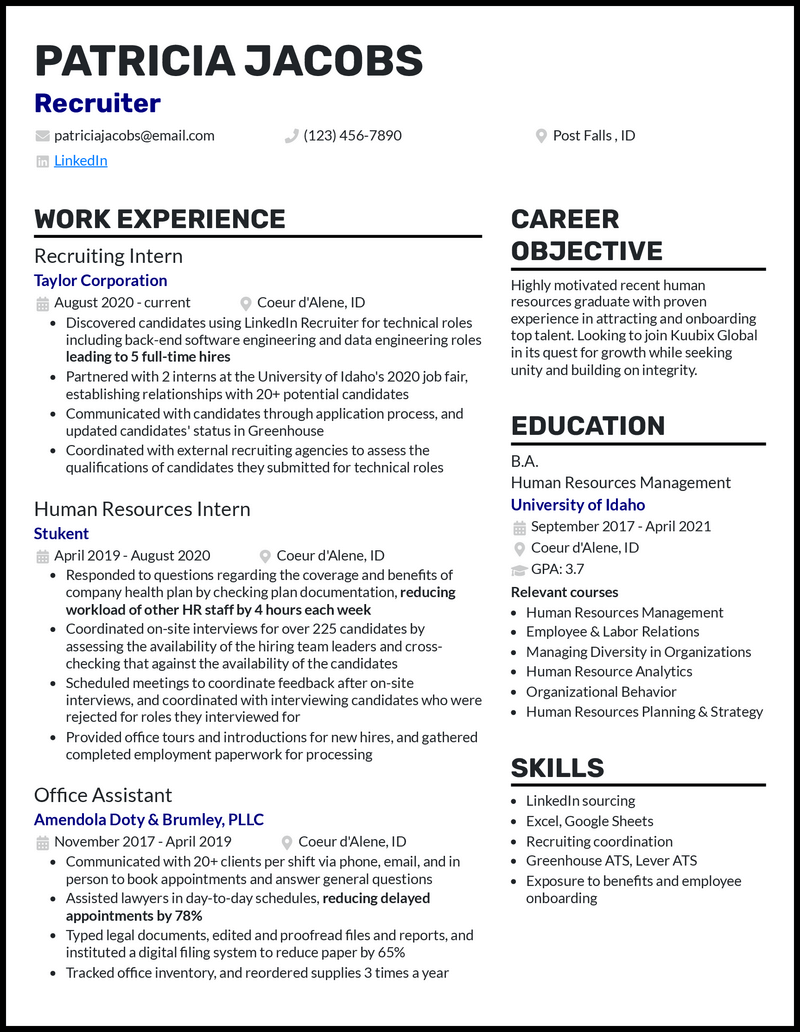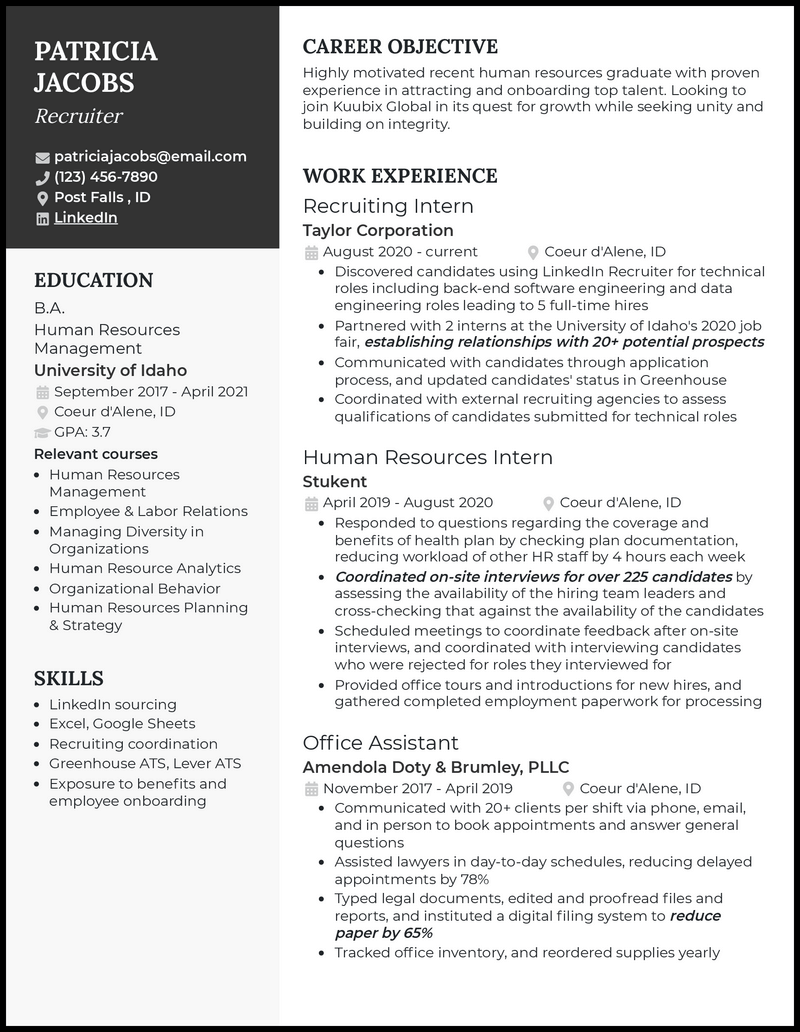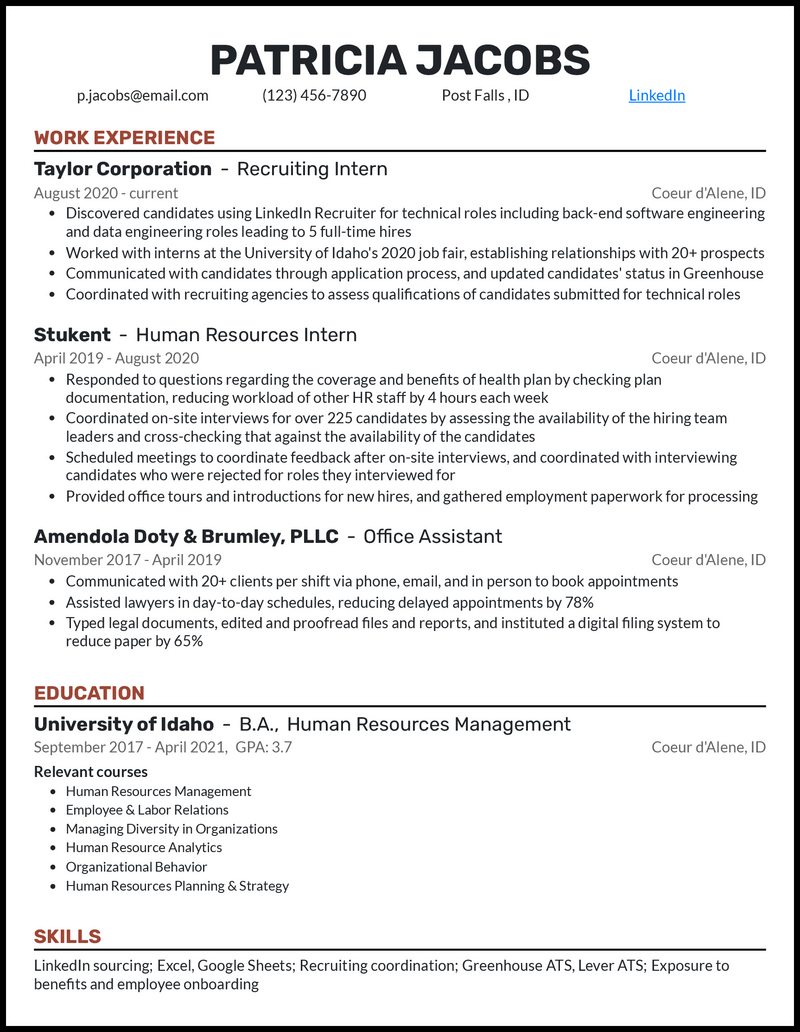You’ve done great so far at assisting experienced recruiters in finding ideal candidates for clients’ open job roles, ensuring that each match maximizes benefits and productivity for everyone. You stay organized while you help prepare job ads, review applications and resumes, and even help with interviews.
But what about your own resume? Should you include other application materials? You may still have questions about how to break into recruiting, and that’s totally fine!
We’re here to help. Tons of people in the recruiting field have gotten callbacks with our professional resume templates. Check out these three entry-level recruiter resume examples and tips to get started!
Related resume examples
What Matters Most: Your Skills & Experience Sections

You know all about how important your skills are for recruiters—you’ve seen it! Your skills section is there to show recruiters how you can assist with interviews and streamline hiring processes, alongside how your abilities set you apart from other candidates.
As you’ve witnessed, keeping your skills profession-oriented makes all the difference! Make sure each ability you list, like Lever ATS and MS Word, relates directly to the key tools that you have at your disposal as an excellent entry-level recruiter.
You also want to highlight your effectiveness and depth of knowledge in what you do by getting highly specific with your skills. Shun vague terms like “communication” or “documentation” in favor of specifics like these:
9 best entry level recruiter skills
- MS Excel
- MS Teams
- Google Sheets
- Recruiting Coordination
- Greenhouse ATS
- Lever ATS
- Benefits Packages
- Interviews
- Employee Onboarding
Sample entry level recruiter work experience bullet points
Now that you’ve assembled your most specific and relevant skills, it’s time to tell the lucky recruiter who reads your resume about your accomplishments! Share your experience points efficiently. Use each one to exemplify how you could improve hiring rates or reduce manual work for senior recruiters.
Think of an array of experiences you’ve had: The more variety you can pack into your experience points, the better. You can even include overlapping abilities from unrelated job roles, like MS Word and interviews: This shows your adaptability and willingness to grow within your role, elevating your recruiting team to new heights!
And don’t forget to back up your successful points and claims with quantifiable data like onboarding efficiency rates! You’ve got to show recruiters that you’ve made positive, measurable impact to stand out.
For example:
- Typed legal documents, edited and proofread riles and reports, and instituted a digital filing system to reduce paper costs by 64%
- Coordinated on-site interviews for 244+ candidates, assessing availability of the hiring team leaders and reducing scheduling errors by 13%
- Discovered candidates using LinkedIn Recruiter for technical roles including back-end software engineering and data engineering roles, leading to 5 full-time hires within a month
- Assisted lawyers in day-to-day schedules, reducing delayed appointments by 78%
Top 5 Tips for Your Entry Level Recruiter Resume
- Pick a clean template
- Which templates have stood out to you as an entry level recruiter? Probably clean, organized ones! You don’t have a lot of time to look each resume over, and neither will the recruiter who looks at yours. Use an eye-catching template that puts your best information in the spotlight to make things easier!
- Show depth of knowledge
- Reference specialized tasks and niches like interviewing or social media whenever possible in your experience points. Highlight a particular trend of prowess in your professional history to demonstrate the dedication and specialization that make you uniquely desirable.
- But show versatility, too!
- Even while you demonstrate depth of knowledge, don’t forget to show how versatile you can be! Adaptability is a big part of the recruiting role, so use experience points with diverse contextual backstories of hiring time crunches and budgeting overhauls to show that you have plenty of tricks up your sleeve.
- Less is more
- At least when it comes to your entry-level recruiting resume’s appearance. Keep your color use to a tasteful minimum, avoiding anything too “loud” that will distract from your qualifications.
- Prioritize readability
- As you surely know, any resume or application that’s difficult to read is among the first to go. So make sure you keep your bullet points concise and clearly linked to your recruiting role, and stick with highly readable fonts.
Yes: Including relevant courses and any other certifications you have can really give your entry-level recruiter resume an extra spark! Just make sure anything you include is distinctly relevant to the job role so that you don’t appear to be grasping at straws.
Definitely! An ideal resume will always be one page or less to maximize readability and demonstrate your efficiency. Picking a professional template can help you fit all the onboarding and documentation puzzle pieces you need on your resume!
For starters, making a cover letter can be an amazing addition to your entry-level recruiter application—and a great home for any accomplishments that didn’t fit on your resume. You can also include letters of recommendation from previous employers (or professors if you’re a new graduate).








